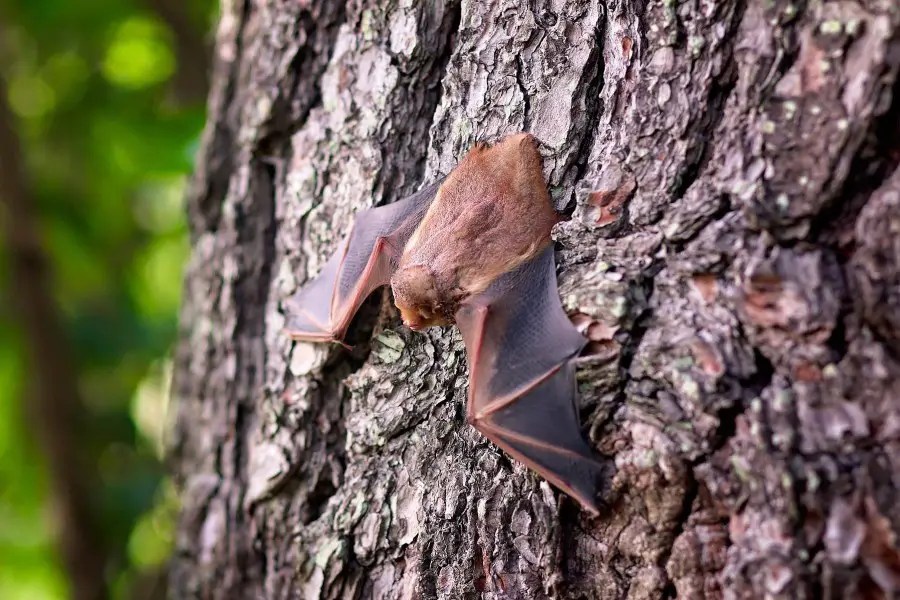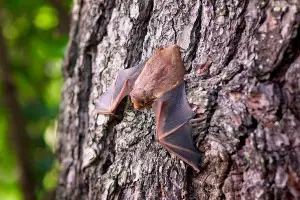
Bats have been living in people’s attics and close to people’s homes more and more often. As urbanization continues bats and other animals have nowhere else to go but to the cities, suburbs and into people’s homes. With all these bats coming into human areas you might be asking yourself are bats dangerous to humans? And if so in what way are the dangerous to humans.
Bats don’t have the best reputation. They are usually shown in movies and TV shows being evil and having associations with vampires. In reality, they are quite peaceful creatures but they can be dangerous as they carry diseases that can be fatal to humans.
Table of Contents
Are bats dangerous to humans?
Bats can be dangerous to humans in a variety of ways, they can carry diseases and pass them to humans
ABLV: This disease (Australian bat lyssavirus) is a virus that can spread to humans through the bat’s saliva. This happens if the infected saliva gets into contact with broken skin on the human, humans can also become infected if the saliva gets into the mucous membrane of the human. This is a fatal disease but don’t worry too much, only three people have ever been infected with this disease.
Histoplasmosis: This results in a lung infection in humans. The disease travels in the bat droppings, if you inhale any of the dust created by the bat’s droppings then you run the risk of getting this disease. If you are working with bats or come into contact with bats for recreational reasons you will need to wear protective equipment. This equipment will include gloves, overalls and masks, the masks need to have a HEPA filter. I have a more in-depth article on bat droppings here.
Leptospirosis: You can get this disease if you work with bats and are exposed to the urine of the bat, this can be fatal to humans but this disease is only fatal in rare cases. To protect yourself from getting this disease you will need to prevent the urine from coming in contact with your mouth, open wounds, nose or eyes.
Rabies: Bats, just like a variety of other wild animals, will carry some sort of rabies. A human can get infected with rabies through a bite or a scratch from a bat. An infection of rabies can also happen if the bat mucus gets into contact with your nose mouth or eyes. Rabies can have a number of alarming effects on humans and can be fatal
Do bats bite people?
Bats are not an animal that will attack or bite people because they choose to. Normally the first instinct of a bat is to fly off to avoid human contact. If you’re handling a bat and it gets uncomfortable or scared it might bite or scratch you to try to get away. On the occasion that the bat is sick it won’t seek out any other animal to pester, it will look for a secluded place to die peacefully.
If a bat bites you then you need to thoroughly wash the wound. You also need to apply some antiseptic to the area after you have washed it. Right after washing you need to seek medical attention. You can get injections against the ABLV disease
Preventing bat bites:
You won’t know which bats have a disease and which don’t so it’s best to avoid them. Better safe than sorry. This is what you can do:
- Don’t touch the bat or the bat’s droppings
- Use mosquito nets in your home to prevent them from entering your home
- Do not enter spaces where you know there will be many bats
- Clean up any areas in your house that might have been home for bats. I suggest you go to a professional but if you can’t then you can do it yourself
Bat droppings clean-up:
- You should only do the clean-up if you are a healthy individual with no immune system issues
- Wear thick gloves, overalls, a hat, shoe coverings and a mask with a HEPA filter
- Use 10% bleach to spray onto the bat droppings to moisten them and prevent them from breaking
- Pick the droppings up and throw them into a heavy-duty plastic garbage bag, try to avoid the droppings breaking
- Sweep up any of the smaller pieces after the solids have been picked up.
- Throw the dustpan and broom away with the gloves and all other protective wear
- Use an enzyme-based decontaminant, ensure that it has a deodorizer
- Contact your local hazardous waste management services, this cannot be thrown away with regular waste.
Quick tips:
- If you aren’t trained you shouldn’t be handling bats
- You need to wash your hands after you handle bats.
- If you aren’t vaccinated you shouldn’t be handling or touching bats
- On the rare occasion that you find an injured bat somewhere, it won’t be a good idea to try to help it or even touch it.
- If you find a bat what seems to be a wounded bat laying outside on the ground you should call animal rescue services to deal with the animal.
I hope you enjoyed my article on are bats dangerous to humans. If you enjoyed the article please share it.

